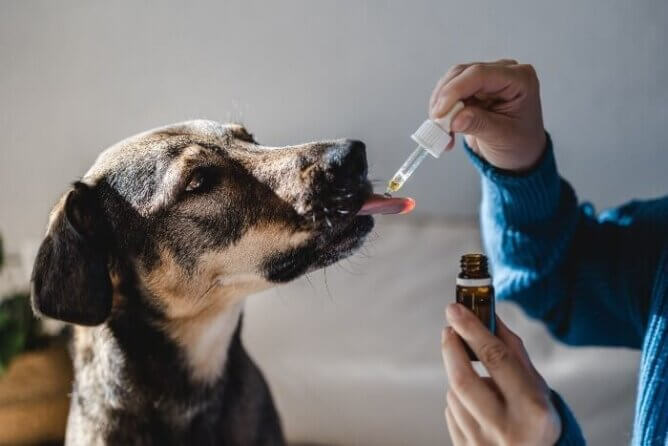Is CBD Right For My Dog?

DogFoodAdvisor is reader supported See how
Dog Food Advisor is 100% impartial and is never paid to promote any brand. But if you buy using links on this page, we may earn a referral fee.
As we’ve talked about before, CBD for dogs is increasingly popular — much as it is for humans. The driving force behind this appears to be people searching for a natural (or, indeed, any) solution to canine medical issues such as joint pain, anxiety, allergies, and digestive issues.
Demand has driven supply, leading to a plethora of CBD suppliers and, as comes with that, a lot of marketing and advertising of CBD’s benefits. It’s been promoted as helping anxious dogs who panic when they go to the groomers or for a drive in the car; who freak out at firework; who show signs of aging, or who have runny stools.
This info-overload has led to much confusion and doubt — a reason why some pet parents are cautious or even skeptical about using CBD for their dog. Indeed, while many veterinarians are strongly in favor of CBD, others admit to having little or no knowledge of its workings.
All of this makes this question tough to answer: Is CBD right for my dog?
To hopefully clarify matters, we spoke to Dr. Jeff Pollard, DVM, DABVP and Chou2Pharma CEO Alexandra Wakim.
How do you typically see your clients using CBD?
JP: “As professionals, we see hemp derived products largely used for anxiety in all forms (separation, storms, stress from vet visits or grooming), mobility, general comfort, post-operative pain management, hospice. CBD is a wonderful compliment to pre-visit and transportation calming techniques when it comes to veterinary visits. I always encourage a trial run at home before the vet visit.”
How can CBD work in so many different applications?
AW: “To summarize our brilliant Chief Scientific Officer, Blake Smith, CBD and other cannabinoid molecules interact with your dog’s Endocannabinoid System (ECS) with one key goal: to establish homeostasis, or equilibrium. When dogs experience distress or discomfort, it is an indicator that their ECS is out of balance.
“The molecules found in hemp, such as CBD, CBG, CBN, CBC, and more, help to fill that need — they interact with your dog’s system to reestablish homeostasis. The cannabinoids mimic your dog’s natural neurotransmitters, that are unable to provide adequate support and therefore causing discomfort, nervousness, etc.
“Blake has always described CBD as a skeleton key. CBD interacts with both CB1 and CB2 receptors in the ECS, so it has more receptors with which it can bind. However, we can get even more specific, depending on the dog’s need. Each cannabinoid (there are over 120) has a unique function, shown in the growing body of scientific data. It’s the reason we use CBD and CBG in our Comfort and Digest formulas – because each of those molecules play a key role in supporting those specific needs.
“We have a Senior Comfort product launching soon that leverages five unique cannabinoids (CBD, CBG, CBDV, CBC, CBN), because seniors have more specific needs than your average hip and joint or digestive concerns. Rather than relying on the skeleton key, we opted for a more targeted approach. It can be confusing, because the general public refers to all cannabinoids as ‘CBD’ because it’s easier. But technically speaking, there’s a lot more to it.”
So CBD is often referring to a wide range of hemp molecules?
AW: “Correct. That’s why you see ‘broad spectrum’ and ‘full spectrum’ labeling with some CBD products, which also contain trace amounts of another common molecule, THC (the psychoactive component of cannabis). There are different levels of precision and purity. At Chou2 Pharma, we used the purest form of cannabinoid molecules (so, neither broad- nor full-spectrum) — which is also what enables us to be THC-free.”
Should pet parents consider CBD over other supplements or treatments?
JP: “Not necessarily — it could be used instead of or in conjunction with. For example, glucosamine/chondroitin, a common supplement for joint pain, reduce the rate of collagen (joint tissue) degradation. The most comprehensive long-term study of them is the Glucosamine/Chondroitin Arthritis Intervention Trial (GAIT). The first phase of GAIT, published in 2006, found that the combination of glucosamine and chondroitin sulfate didn’t offer significant relief to participants in general, but it did help a small subgroup of those with moderate-to-severe knee pain. In follow-up results of the study released in 2010, these supplements improved pain and function, although no better than a placebo or the NSAID drug celecoxib.
“All this to say, data shows that glucosamine/chondroitin helps some patients and is generally safe when made by reputable brand. The same can be said for cannabinoid products, though the data continues to grow favorably. However, the combination of the two increases a patient’s chance of improvement.”
AW: “We see that exact feedback with a lot of our customers and veterinary distributors. For example, if a dog is already taking a glucosamine/chondroitin joint supplement, why not improve the impact with Comfort CBD/CBG based soft chew – which contains both cannabinoids and other key joint health ingredients? Or upgrade a pet’s daily probiotic with the highest purity cannabinoids available, as seen in our digestive health formula?
“Many of our veterinarians and pet parents see CBD as a tool in their tool kit, providing an effective, plant-based option in a multi-faceted regimen. It’s also important to note that many pet parents (85% of those polled in a 2016 survey[1. In a 2016 survey, 632 pet owners were asked how important several reasons were in their decision to use any hemp products. “The most commonly endorsed reasons included liking the idea that the products came from natural sources (rated as moderately or extremely important by 85.1%).” Kogan, L., Hellyer, P., Robinson, N., et al. Consumers’ Perception of Hemp Products for Animals. AHVMA Journal 2016; Vol 42, Spring Issue: 40-48. Available from:
https://www.ahvma.org/wp-content/uploads/AHVMA-2018-V51-CannabisUseandPerceptions.pdf]) champion a natural approach to wellness and CBD products fit the bill. Knowledge is power, and knowing what tools are at your disposal is the first step to a happier pup. We’re always happy to answer any questions people might have.”
Final word
The Dog Food Advisor does not accept money, gifts, samples or other incentives in exchange for special consideration in preparing our reviews.
However, we do receive a referral fee from online retailers (like Chewy or Amazon) and from sellers of perishable pet food when readers click over to their websites from ours. This helps cover the cost of operation of our free blog. Thanks for your support.
For more information, please visit our Disclaimer and Disclosure page.



